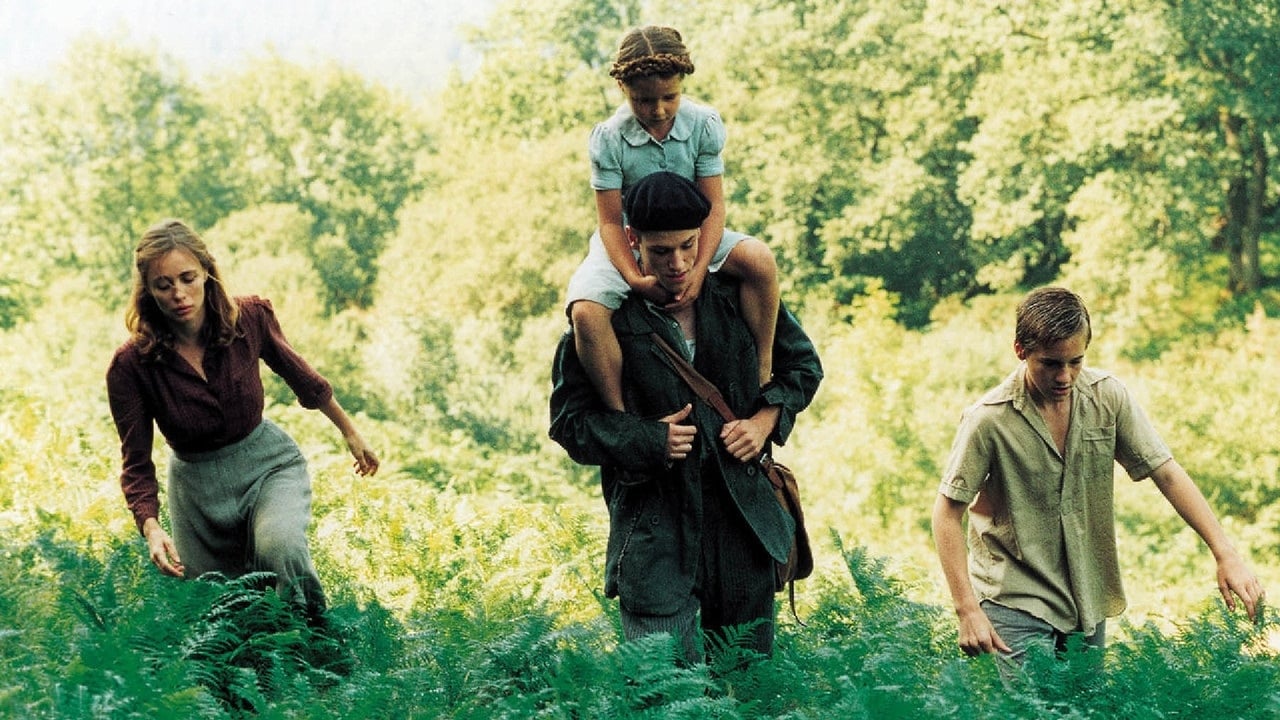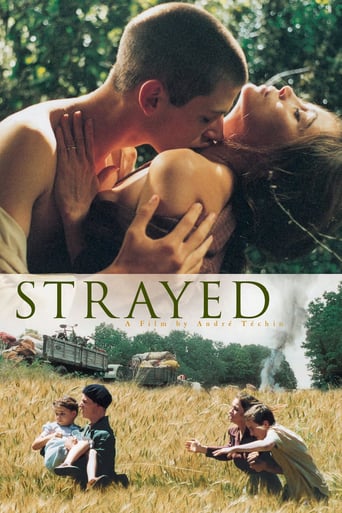

Why so much hype?
... View MoreA Brilliant Conflict
... View MoreSimple and well acted, it has tension enough to knot the stomach.
... View MoreThe movie really just wants to entertain people.
... View MoreSTRAYED is yet another of those tender French films about survival and discovery under the duress of World War II. Based on the novel 'Les Egares' by Gilles Perrault and adapted for the screen by Gilles Taurand, STRAYED is an elegantly honest tale of a small family forced to evacuate Paris during the Nazi invasion and how that disruption in their lives ultimately enhances their view of the world.Odile (Emmanuelle Beart) is an educated mother of two children, Cathy (Clemence Meyer) and Philippe (Gregoire Leprince-Ringuet), who has been teaching school and raising the dignity of her family until the war disrupts everything. During a blitz Odile hurries Cathy and Philippe into her car and drives out of Paris to the South to escape the Nazis. Her car breaks down and is burned and in a moment of desperation a young illiterate lad, Yvan (Gaspard Ulliel) from a reformatory offers his help and assists Odile and her family in finding refuge in a deserted country estate. Odile is at first cold to Yvan, but as the children warm to him, and as Yvan captures food for their table, Odile softens, no longer looking at this illiterate young lad as someone beneath her, and begins to teach him how to write and read.Yvan keeps his past a secret, maintaining a mystery about himself that makes him all the more appealing. In time Odile succumbs to her physical attraction to Yvan and this warmly extended 'family' enjoys the beauty of the French countryside and new home...until the war seems over. Gendarmes visit the house, arrest Yvan as being an escapee from a reformatory, and because Odile and her children are illegally living in another person's home, they are moved to a refugee camp.The manner in which this story pummels to an end is tense and tender and as directed by Andre Techine, the lessons of living, loving and surviving war are fully explored.Odile is probably one of the beautiful Beart's finest roles, matched in sensitivity only by Gaspard Ulliel's finely wrought Yvan. The cinematography is breathtaking and the musical score is supportive without disrupting the flow of the film. Highly recommended on every level! Grady Harp
... View MoreBeing French and somewhat interested in history, I think I can give my 2 bits on a few questions about this movie:Why does the kid sing a song in German? My idea is that because friendship between France and Germany is now so sacro-saint, the director felt the need to remind viewers that all this was past history and we are now the best of friends. I think this was necessary because of the very graphic and terrifying scenes of refugees being bombed by German planes.Historical movie or individual adventure? I think both. The story is one of individuals cut off from the rest of the world, but the atmosphere of chaos, of loss of values, of breakdown of civilization, of not knowing where to go or what to do, appears to be representative of the way the people who lived through the events felt about them. Gaspard Ulliel, who seems to appear out of nowhere, as if a product of the times, personifies very well this feeling of chaos. Some also lived that period as a holiday from their everyday lives - if they were unattached and could fend for themselves. Alphonse Boudard's autobiographical book "Les combattants du petit bonheur" captures that outlook.The fact that they are cut off from the rest of the world makes the movie more present, like something that could be happening here and now. Most of the time you don't get the usual distraction of local color - costumes, old cars, etc- to show that this really is the past. Personally I get annoyed at movies that use sepia coloring, or historical allusions like famous news radio broadcasts so that you can't forget for a moment the distance between then and now.Moreover I think this movie fits into a trend of recent studies of history. A lot of books or documentaries on historical events stress the importance of understanding individual experiences to get a glimpse of the big picture.
... View MoreAndre Techini's "Strayed," or perhaps more accurately, "the lost" or "displaced" people, has a simple premise. A school teacher, whose husband was killed in the early days of the war, takes her two children and flees Paris in the face of the Nazi advance on the City of Lights. In the countryside, as they are stuck in a massive traffic jam made up of refugees, they are strafed by German fighters in a harrowing scene that reminds you a little of the bombardment of the advancing troops in "All Quiet on the Western Front."They lose their car and all their possessions, but are rescued by a strange, resourceful teenager who becomes their guide, companion, but in some ways, their charge, as they try to hide out -- from the war itself.This is the kind of film that most American audiences wouldn't like, because after that strafing run, not another shot is fired, not another blow struck. The story that plays out is about the main characters getting to know, tolerate and even grow found of one another, but then finding themselves faced with some uncomfortable choices.Gregoire LaPrince-Ringuet is very good as the 13-year-old boy of the family who might have been elevated to the man of the house status, had not the mysterious teenager arrived on the scene. But rather than show resentment, he winds up doing everything possible to become the older boy's friend.Gaspard Ulliel is quite effective as the older boy, a sort of domesticated wild child. But the film belongs to Emmanuelle Beart, who plays the mother.Beart's character is fascinating. She has lost her husband, her home, everything she has except her two kids. She is on the road with them, dead broke, dead tired and close to despairing. But of course, she is a tower of strength, right, magnificently holding her family together in the face of personal disaster and global chaos.Actually, no. Beart's character is depicted as a woman clearly out of her depth who can barely keep herself together in the face of the problems confronting her. She's like a ticking time bomb, ready to completely fall apart at any moment. The only thing that holds her together is her rigid, school teacher training that allows her to continue to run her fugitive family as if she is maintaining order in a classroom during an unplanned fire drill. And it works. Beart comes off neither as the typical weak, frightened woman Hollywood movies presented so often in the 50s, nor the kick butt superwoman that we see so often in American films today. Beart is so frightened during the air attack that she pees in her pants. She is so in need of structure to take her mind off things that she starts cleaning the windows of the abandoned home they later hide in.But she is also together enough to handle a couple of French soldiers who drift by, easily dealing with them when her self-appointed teenage protector is so unsettled by these two potential rapists he can't even stay in the house with them.Beart underplays her role, which features spartan dialogue to begin with. But there is a lot going on for her and you see it all playing out in her eyes, and behind her eyes as well.It is another great performance from this French star and the film would be worth seeing just to study her acting, even if she were not one of the screen's great beauties.
... View More"Strayed" is the second French movie released in the U.S. recently in which fleeing urban refugees seek to outrun the German Army when the so-called "Phony War" turned very real in the spring of 1940. Where "Bon Voyage" combines a serio-comic homicide and some high-strutting portrayals of sundry officials, a movie star, hangers-on and their sycophants, as well as a conventional anti-Nazi plot, "Strayed" is director Andre Techine's finely honed and narrowly focused look at a family trying to survive.Odile (Emmanuele Beart) lost her husband in the early days of the war (he died a hero-a must for any French WWII film). She and her two children, Philippe (Gregoire Leprise-Ringuet), thirteen, and Cathy (Clemence Meyer), about eight, abandoned their Paris home as German forces surged towards the city. Their car was destroyed by a marauding enemy plane and they narrowly escaped death. Trekking into the woods they're accompanied by a mysterious young man, still a teen, Yvan (Gaspard Ulliel), a fellow who seems to have considerable wilderness skills and whose very short hair was not in fashion among young French men at the time. A clue about his past. Yvan is not forthcoming about his pedigree or his recent activities.Yvan breaks into a lovely house abandoned by its owners, classical music performers. Before letting the family in he insures that they will be there for a while by several acts of sabotage.The story unfolds with relationships developing across age and gender lines, not without problems. Philippe befriends Yvan who can be haughty and dismissive of the younger boy, causing the latter pain. Cathy is a genuine, normal for her age pest, the kind who both exasperates and amuses. And the beautiful Odile finds it hard to resist being attracted to their mysterious benefactor who knows how to bring "home" if not the bacon, then the bunny.Unlike "Bon Voyage" there are no anti-Nazi polemical messages here. Technine provides the basic facts: loss of a husband and father, dislocation that, perhaps, was unnecessary (although Odile does remark that she wouldn't collaborate with the invaders), a dark, almost scary at times benefactor springing up from nowhere. Adapting to rapid change in a lush and verdant countryside still largely unmarked by combat is the key.Scenes are shot with mostly close-ups so that the characters' faces relay feelings. Very good cinematography.Technine is a good storyteller and Beart is quietly effective in the very familiar role of "What's a mother to do?" She hasn't resolved the loss of her husband - she still grieves - but she also can't repress her femininity and sexuality. Odile is very believable as are her kids.An impressive French film.8/10
... View More